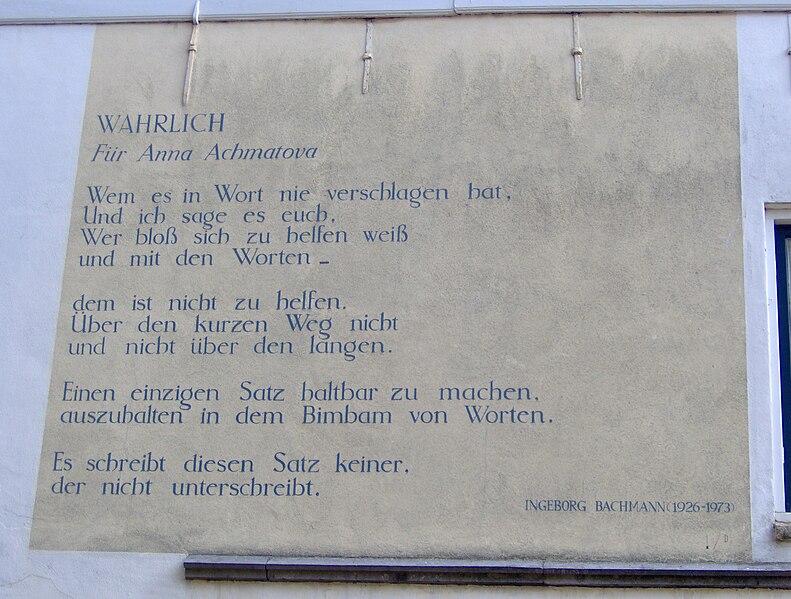Ingeborg Bachmann (25 June 1926 â€" 17 October 1973) was an Austrian poet and author.
Biography

Bachmann was born in Klagenfurt, in the Austrian state of Carinthia, the daughter of a headmaster. She studied philosophy, psychology, German philology, and law at the universities of Innsbruck, Graz, and Vienna. In 1949, she received her Doctor of Philosophy from the University of Vienna with her dissertation titled "The Critical Reception of the Existential Philosophy of Martin Heidegger," her thesis adviser was Victor Kraft.
After graduating, Bachmann worked as a scriptwriter and editor at the Allied radio station Rot-Weiss-Rot, a job that enabled her to obtain an overview of contemporary literature and also supplied her with a decent income, making possible proper literary work. Furthermore, her first radio dramas were published by the station. Her literary career was enhanced by contact with Hans Weigel (littérateur and sponsor of young post-war literature) and the legendary literary circle known as Gruppe 47, whose members also included Ilse Aichinger, Paul Celan, Heinrich Böll, Marcel Reich-Ranicki and Günter Grass.
In 1953, she moved to Rome, Italy, where she spent the large part of the following years working on poems, essays and short stories as well as opera libretti in collaboration with Hans Werner Henze, which soon brought with them international fame and numerous awards. Her relationship with the Swiss author Max Frisch (1911â€"1991) influenced the depiction of the second protagonist in Frisch's 1964 novel Gantenbein upon her. His infidelity, and their separation in 1962, had a deep impact on Bachmann.
Bachmann's work primarily focuses on themes like personal boundaries, establishment of the truth, and philosophy of language, the latter in the tradition of Austrian philosopher Ludwig Wittgenstein. Her doctoral dissertation expresses her growing disillusionment with Heideggerian Existentialism, which was in part resolved through her growing interest in Wittgenstein, whose Tractatus Logico-Philosophicus significantly influenced her relationship to language.
On the night of 25/26 September 1973 a fire occurred in her bedroom, and she was taken to the Roman Sant' Eugenio hospital for treatment. (Local police concluded that the blaze was caused by a cigarette.) During her stay, she experienced withdrawal symptoms complicated from barbiturate substance abuse. The doctors treating her were not aware of this habit, and it may have contributed to her subsequent death on 17 October 1973. She is buried at the Annabichl cemetery in Klagenfurt.
The Ingeborg Bachmann Prize
The Ingeborg Bachmann Prize, awarded annually in Klagenfurt since 1977, is named after her.
Works
Poetry collections
- 1953: Die gestundete Zeit
- 1956: Anrufung des Grossen Bären
- 2000: Ich weiß keine bessere Welt. (Unpublished Poems)
- 2006: Darkness Spoken: The Collected Poems of Ingeborg Bachmann. translator Peter Filkins, Zephyr Press, ISBN 9780939010844
Radio plays
- 1952: Ein Geschäft mit Träumen
- 1955: Die Zikaden
- 1959: Der gute Gott von Manhattan (won the Hörspielpreis der Kriegsblinden in 1959)
Libretti
- 1960: Der Prinz von Homburg
- 1965: Der junge Lord
Collections of short stories
- 1961: Das dreißigste Jahr
- 1972: Simultan/Three Paths to the Lake
Novel
- 1971: Malina (Translated into English by Philip Boehm. Holmes & Meier, 1999.)
Unfinished novels
- 1955:Todesarten/The Book of Franza & Requiem for Fanny Goldmann (novel-cycle project)
Essays and public speeches
- 1959: Die Wahrheit ist dem Menschen zumutbar (poetological speech at a German presentation of awards,)
- 1955: Frankfurter Vorlesungen (lecture on problems of contemporary literature)
Letters
- Ingeborg Bachmann-Paul Celan: Correspondence (letters between Ingeborg and Paul Celan, published 2010 by Seagull Books)
- Letters to Felician (letters to an imaginary correspondent, written 1945, published posthumously). Edited & translated into English by Damion Searls. Green Integer Books, 2004.
- War Diary, Translated by Michael Mitchell, Seagull Books, 2011, ISBN 9780857420084
See also
- List of Austrian writers
- List of Austrians
References

External links
- Ingeborg Bachmann in the German National Library catalogue
- Ingeborg Bachmann at perlentaucher.de â€" das Kulturmagazin (German)
- author page at Lyrikline.org, with audio and text in German, and translations into Dutch.
- "The Drugs, the Words" Center for the Art of Translation Web Exclusive Content, Translated by Peter Filkins (English)
- ""The Drugs, The Words"; "The Bridges"". berfois.Â
- "Ingeborg Bachmann". The Literary Encyclopedia.Â

